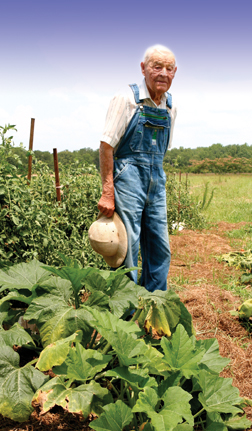CENTURY GARDEN: Even At 100, Opp Man Keeps Busy On Farm

Like the yellow light bulb on the front porch of his Opp farmhouse, J.C. Carnley keeps on going — maybe not as brightly or as energetically as he once did, but certainly far longer than anyone could’ve predicted. The bulb was there the day J.C. and his beloved wife, Vertie Mae, moved into the block house on Hattaway Road. “It was the second day of January ’46,” he says, recalling the date as if it was yesterday.
That’s a long time for any light bulb to burn — so long that J.C.’s daughter, Katie Wilkes of Opp, wrote General Electric about it. But it doesn’t hold a candle to J.C. who, at 100 years old, still drives himself to the barbershop, church and the grocery store, still does his own laundry and own cooking, still mows his own lawn, still occasionally climbs astride a tractor, and of course, is still asked how his garden grows.These days, his reply is “not so good.” The drought has all but choked the life out of the small garden he tends on the edge of his yard. The crooked neck squash is a bit thin, the worms ate his cabbage, and the tomatoes — well, he says, “the only thing they’re going to make is a failure.”There are still a few of his famous yellow-meat watermelons in the garden, but the man many have come to know as “the Watermelon Man” says those won’t last long: “There’s too many widow women around,” he jokes.”He always has to give the widow women a watermelon,” explains daughter Katie. “He never has enough to sell after giving ’em all away.”That’s OK with J.C. — he’s not farming for profit anyway. “I just love to do it,” says Carnley, who turned a century-old on June 21, 2007. “Just got it in my blood I reckon. It’s a lot better doing something than just sitting around. If a fellow just lies down, he’ll get to where he can’t get around.”Of course, there are some things he can no longer do. That’s why he turned over the farm surrounding his home to his son Virgil who, at 76, farms the same 120 acres where he once grew cotton, corn, peanuts and a half-acre watermelon patch.The farming bug bit early. Born the same year Oklahoma was admitted into the Union as the 46th state, J.C. (the initials don’t stand for anything) was the second of 11 children, and the eldest of seven sons. “Since I was the oldest boy, Daddy would go off to do something, and he’d say, “Now, J.C., you get these boys to work! … Now, when you’re talking to your brothers about work, you can get in a fuss pretty quick.”At 22, he was ready to make Vertie Mae Johnson his wife, and nothing was going to stop him. “We married the 19th day of March in ’29,” he says. “We planned to get married earlier, but it came the Elba flood (the Pea River crested at 43 1/2 feet on March 15), and I couldn’t get to Elba to get my marriage license. So, I borrowed my daddy’s old Model T, and I drove it through an old railroad bed through the woods to Enterprise to get our license.”J.C. worked briefly in a sawmill and peanut house, but always considered himself a farmer first. He remembers the good years and the bad years, including the year when he and Vertie Mae moved into their home on Hattaway Road. “I had to borrow money just to buy the place, and I had rented out some land to grow cotton,” he said. “It rained and rained, and weeds got up big, and the boll weevils got into it. I think I got two bales off of 12 acres. It looked like I was in real trouble.”He remembers, too, reluctantly selling two of his three mules for a “red-belly Ford” tractor. That was in 1950, and though it brought its own share of headaches, he never looked back.Before she passed away on Jan. 12, 1998, after 69 years of marriage, Vertie Mae and J.C. had raised another crop — two daughters in Katie of Opp and Ann of Winter Garden, Fla., and two sons in Virgil of Opp and James of Daphne. Today, J.C. counts nine grandchildren and 25 great grandchildren among his accomplishments.But as for his longevity, he said the credit for that lies elsewhere. “Don’t give me praise for reaching 100,” he says. “Give that credit where it belongs — to God. It was His will.”
